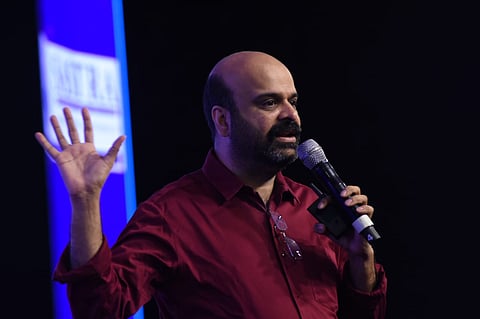

CHENNAI: Renowned musician and educator Anil Srinivasan, on Day 2 of the 13th Edition ThinkEdu Conclave, presented by SASTRA University, delivered an impactful address, asserting that access to experiential learning holds transformative potential for our country. He illuminated his central thesis through a dynamic blend of crowd engagement, inspiring anecdotes from his students, and soulful renditions of popular music.
Srinivasan's address titled Haryana to Harvard: The Unbound Classroom, chaired by senior journalist Kaveree Bamzai, dived into the evolving landscape of classrooms, especially for students from rural India, particularly in the aftermath of the pandemic.
Addressing the misconception that traditional classrooms could become obsolete with the rise of online education, Srinivasan shared insights from his extensive work with over seven lakh school students in India. Contrary to expectations, he highlighted that post-pandemic, students displayed a keen enthusiasm to return to physical classrooms.
"Despite the surge in Zoom classrooms during the pandemic, children eagerly returned to schools once the crisis subsided. Amidst suggestions that schools should repurpose their real estate into resorts with the shift to online education, the reality emerged starkly once the pandemic subsided -- children eagerly rushed back to their classrooms," he said.
Sharing insights, Srinivasan shared that some students highlighted the joy of laughter being restricted at home during classes, as it conveyed to parents a lack of seriousness about education. Moreover, students expressed a sense of equality and camaraderie in schools, where everyone was on the same level and adorned with uniforms.
In a particularly moving revelation, Srinivasan disclosed that certain female students in Madurai admitted to feeling more loved by their teachers and classmates than in their own homes.
"If our educational efforts do not result in a child feeling loved in the classroom, then they are rendered useless," said Srinivasan, emphasising the profound impact of a nurturing and supportive learning environment.
Re-imagining the classroom
In a compelling revelation Srinivasan shed light on the profound impact of the "experience of learning" as opposed to the factual content found in textbooks. Drawing from a survey, Srinivasan emphasised that the memorable aspects of learning were tied to the experiential journey rather than mere textbook information.
To underscore this perspective, Srinivasan played a segment from the song Ararari Raro, featured in Shah Rukh Khan's film Jawan, on his keyboard. He noted how the audience could mentally complete the song due to the audio-visual experience of watching their favorite actors and listening to the beautiful voices of the singers.
"This is because the song lingers in your memory, facilitated by the audio-visual experience of witnessing the actors you enjoy and hearing the beautiful voices of the singers. The same principle applies to learning; a standardised textbook does not resonate with everyone," he articulated.
In a survey querying students about their ideal classroom settings, Srinivasan shared that students advocated for a circular seating arrangement to foster equality. The students expressed a desire for classrooms adorned with creations crafted collaboratively with their peers, rejecting the notion of printouts from standardized textbooks for rote memorization.
Remarkably, female students from Dindigul suggested the inclusion of sick beds in classrooms to provide a space for rest and learning during menstrual cycles, challenging the traditional practice of sending students home during such times. Additional recommendations included benches arranged for collaborative learning, a global world map replacing regional maps, and a shift towards more interactive and personalized classroom aesthetics.
"A considerable number of individuals, aged above 40, engage in pontificating about the ideal educational system. However, it is equally crucial to seek the perspective of a 12-year-old," suggested Srinivasan.
He further emphasised that the innovative classroom models were envisioned and constructed by students utilising Lego blocks and 3D rendering software.
'Exams don’t determine self-worth, capacity to contribute does'
Srinivasan, sharing a poignant incident from his battle with Covid-19 during the second wave, revealed the stark reality of prestigious educational degrees wielding a level of privilege that even surpassed class and caste.
Narrating his experience, he spoke of how a highly qualified doctor focused solely on his blood reports rather than his well-being and predicted his imminent demise. Srinivasan's objection to this clinical approach was met with offense as the doctor promptly reminded him of his credentials.
"This made me realize that prestigious education degrees confer a degree of privilege that class and caste do not. I then realised that we, as a society, should not give privileges to people just because they have fancy degrees from fancy places. Experience is what matters," reflected Srinivasan on the inequalities inherent in the healthcare system.
He emphasised that access is the key to addressing such disparities, envisioning a transformative impact if students from rural districts in India were granted access to education from professors in renowned institutions like Harvard, Stanford, or IIT Madras.
To realise this vision, Srinivasan established a platform offering experiential, project-based learning and mentoring from Indian-origin professors in foreign universities. Since its inception in January 2023, he claimed that close to three lakh students from across India have become part of this innovative system.
Highlighting the platform's success stories, Srinivasan cited a group of Class 9 boys from Chennai who, despite scoring modestly in their computer science exam, developed an application for children diagnosed with autism. Similarly, a group of 14-year-old girls from Madurai created an application for menstrual health, with their Harvard professor mentor deciding to invest in their project.
"Educational opportunities are not reserved for the privileged; a single exam will not determine your self-worth. Your capacity to contribute does,” asserted Srinivasan, emphasising the fundamental principle guiding his educational initiative.
Beyond his insightful narratives, Srinivasan engaged and captivated the audience through crowd-based exercises and soulful renditions of popular songs, including Raghupati Raghava Rajaram, creating a memorable and inspiring experience for all present.